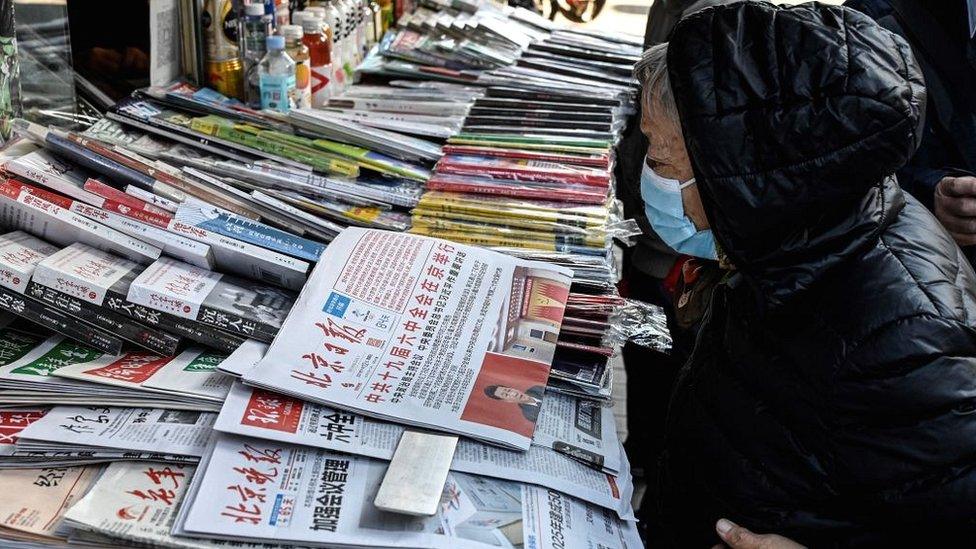China media guide
- Published
This page is no longer being updated. It was last updated on 22 August 2023

China is the largest media market in the world, and has the world's largest online population.
Outlets operate under tight Communist Party control. The opening-up of the industry has extended to distribution and advertising, not to editorial content. However, there is leeway for independent coverage that is not perceived as a threat to social stability or the Party.
Reporters Without Borders (RSF) has described President Xi Jinping as the "planet's leading censor and press freedom predator".
It says government policies are aimed at achieving "complete hegemony over news coverage and the creation of an international media order heavily influenced by China".
Beijing tries to limit access to foreign news by restricting rebroadcasting and the use of satellite receivers, by jamming shortwave broadcasts, including those of the BBC, and by blocking websites.
Overseas Chinese-language news outlets that are not state-owned are blocked in mainland China. However, international English language websites like the BBC are often available to view. But content that is contrary to Communist Party rhetoric is filtered and English-language news sites can be filtered at times of tension.
Fears that the media in Hong Kong would lose their independence when the territory reverted to Chinese control in 1997 have generally not been borne out. Hong Kong still has editorially-dynamic media, but worries about interference remain.
TV is available in most homes and the sector is competitive, especially in cities. There are more than 3,300 local, regional and national TV channels.
State-run Chinese Central TV (CCTV) is China's largest media company. Its dominance is challenged by provincial TVs, which are on the air nationally via satellite. China is a major market for pay TV, which is almost entirely delivered by cable. All of China's 2,600-plus radio stations are state-owned.
There are around 1,900 newspapers. Each city has its own title, usually published by the local government, as well as a local Communist Party daily.
China spends hugely on TV, radio, online and press outlets targeted at international audiences, aiming to extend its political influence and boost its image. It is less keen to allow foreign players into the domestic market.
Phenomenal online growth
China has the world's largest internet-using population. There were 1.01 billion internet users by July 2022, comprising 69% of the population (Worldinternetstats.com).
Around 26% of the online population live in rural areas. The China Internet Network Information Centre (CNNIC) says 98% of China's online population can access the internet via a smartphone.
There are three powerful online giants, known collectively as "BAT": Baidu is the top search engine; e-commerce leader Alibaba has allied with Sina, which operates the Weibo microblog platform; and Tencent owns instant messenger WeChat.
Because of official censorship, Weibo is losing some of its appeal as a forum where relatively uncensored news can be shared.
WeChat, Tencent's take on the WhatsApp instant messenger, has the largest number of domestic users of any social media service in China.
China has the world's largest online video market. Streaming platforms, including market leader iQiyi, Youku Tudou and Sohu have a huge following and pose a challenge to traditional TV.
An extensive web filtering system, dubbed the "Great Firewall of China", blocks tens of thousands of sites using URL filtering and keyword censoring.
Thousands of cyber-police watch the web and material deemed politically and socially sensitive is filtered. Blocked resources include Facebook, Twitter, YouTube and human rights sites.
The use of circumvention tools, including virtual private networks (VPNs), became harder after China strengthened its firewall to allow it to intercept data traffic to and from individual IP addresses. This was coined the "Great Fire Cannon" when it came into effect in 2015.
The government since has signalled that it will ban unapproved VPNs.
Press
People's Daily (Renmin Ribao), external - Communist Party daily, web pages in English
China Youth Daily (Zhongguo Qingnian Bao), external - state-run, linked to Communist Youth League
China Daily , external- official English-language paper
Global Times (Huanqiu Shibao), external - state-run, editions in English and Chinese, focuses on world affairs
People's Liberation Army Daily (Jiefangjun Bao), external - web pages in English
Reference News (Cankao Xiaoxi), external - published by official news agency Xinhua
21st Century (21 Jingji), external - leading business newspaper, privately-owned
Television
Chinese Central TV (CCTV), external - state-run national broadcaster; 18 free-to-air networks
China Global TV Network (CGTN), external - state-run international broadcaster; networks in English, Arabic, French, Russian, Spanish
Radio
China National Radio, external - state-run
China Radio International, external - state-run external broadcaster, programmes in more than 40 languages, notably to Taiwan and Korea
News agency
Xinhua (New China News Agency), external - state-run, web pages in English
China News Service (CNS), external - state-run, web pages in English